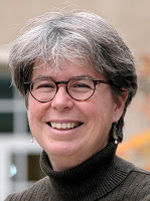In the beginning was the Word, and the Word was with God, and the Word was God. —John 1:1
Chris was curled up on the sofa, recovering from getting his wisdom teeth out and reading. “Why did you pick up that book?” I wondered aloud. Biographies and American history are not his usual fare and we are finally past the summer reading list stage in my house. “It’s the book for all the first year students next fall.” Ah, and since he will be a new student advisor, he thought he’d get on board, too.
Summer with its long light-filled days seems the perfect time for reading, even for those of us no longer bound to lists. Many communities, from colleges to cities to entire states, take up a single book to read. This year, Philadelphia read Christina Baker Kline’s “Orphan Train.”
Reading one book gives us common ground to start conversations. It also lets us travel to new places and hear new voices together. Reading can move us, even transform us.
In July of 386, St. Augustine was sitting in his garden in Milan. He was ill and torn by indecision. Should he continue to teach, or should he follow St. Anthony’s lead and abandon everything for the sake of the Gospel?
[hotblock]
Then over the garden walls he heard the voices of children calling out, “Tolle, lege!” Take and read. Augustine walked over to where he’d left his copy of St. Paul’s letters, picked it up and opened it at random to the 13th chapter of the letter to the Romans and read, “put on the Lord Jesus Christ.” And he did; he was baptized at the Easter Vigil the following spring.
This summer, my pastor, who is an Augustinian friar, invited us to “take and read,” to read one book from sacred Scripture from beginning to end. In the summer of 2011, Pope Benedict XVI, as part of his general audience comprising a “school of prayer,” made a similar summer reading suggestion, “to enjoy (the Bible) in a new way by reading some of its books straight through.”
My pastor proposed we try the book of Psalms, the 150 hymns and sacred poems the People of God have been praying for almost 3,000 years. In his remarks Pope Benedict recommended trying some of the lesser known books, even giving short teasers for the books of Tobit, Esther and Ruth. (Spoiler alert: he gives away the endings for all three!)
Whatever is on your summer reading list, stir in at least one by the best-selling author, God. May it move you, transform you and give you common ground with centuries of other faithful readers. Tolle, lege!
Going deeper:
Robert Alter’s translation of the psalms is both scholarly and poetic. His introduction and many footnotes provide a backdrop that enriched my praying of the Psalms.
The Grail Psalter is another modern translation which tries to respect the “sprung” rhythm of the Hebrew text. It is used in celebrating the Liturgy of the Hours but is a slightly different translation of the Psalms than what you will hear at Mass.
The New American Bible is available online through the website of the United States Conference of Catholic Bishops. Tobit (which Pope Benedict guarantees can be read in under an hour) is here and the full list of books is here.
Links to Pope Benedict’s full school of prayer are here.
PREVIOUS: Talking with God, not at him, means listening
NEXT: Does Scripture doom an illegitimate child?




Share this story